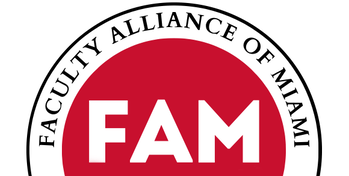Do NTT faculty at Miami have academic freedom? What about due process in case of non-renewal?*
Fact: The answer to both questions is no. While Miami asserts both the value and existence of academic freedom at Miami, it provides due process protections only for tenured faculty — not for non-tenure-track faculty, now the majority of faculty, whose status is much more precarious.
- Miami’s policy manual, MUPIM, specifically associates academic freedom with tenure. (If you aren’t sure what academic freedom is or why it’s important, please read this.)
- Miami’s policy on academic freedom was approved by the Board of Trustees back in 1950, when it was assumed that a strong majority of faculty would be, and would continue to be, tenure-line. As late as 2001 (the earliest data available on the federal IPEDS database), Miami’s percentage of tenure-line faculty was 79%. Now, tenure-line faculty account for 36%—well below half—of total faculty.**
- Miami’s policy claims that teachers are “entitled to freedom in research…and in the classroom” (MUPIM 5.2). However, should nontenured faculty’s freedoms be abridged, no recourse or protections exist for them at Miami.
- MUPIM is silent on academic freedom for NTT faculty—LCPL, visiting, part-time faculty, and graduate students—who teach ~60% of the credit hours at Miami.**
- MUPIM provides for a very loose version of due process in cases of nonrenewal only for lecturers and clinical faculty, and only at department or program level. Due process procedures for these faculty are not required and their nature is not specified.
The point here is not so much that Miami faculty don’t, in practice, have academic freedom most of the time. Most LCPL we’ve spoken with do feel they have freedom in the classroom. The point is that NTT faculty do not have express protections of academic freedom in the form of due process. That means that their academic freedom depends not on policy, but on the will of the people who hire them. And that means that when someone decides not to renew someone and it’s for the wrong reasons — let’s hope that doesn’t happen, but it could and does happen sometimes — then suddenly their academic freedom is a mirage. And if NTT academic freedom could become a mirage at any time, then NTT faculty don’t actually have it at all.
Below are passages from Miami Policy relevant to academic freedom.
From MUPIM 7.3: Tenure & Promotion:
“Tenure is a means of assuring academic freedom: that is, the freedom to teach, to inquire, to create, to debate, to question, and to dissent (see Section 5.1). Such activity is the essence of the search for truth and knowledge, and is primary to the University. This atmosphere is necessary as the University seeks to attract, maintain, and nurture a diverse and exceptional faculty.
From MUPIM 5.1: Principles of Academic Freedom:
“The following statement of principles of academic freedom adopted by the American Association of University Professors in 1940 was approved by the Board of Trustees, June of 1950:
Institutions of higher education are conducted for the common good and not to further the interest of either the individual teacher or the institution as a whole. The common good depends upon the free search for truth and its free exposition. (The word “teacher” as used in this document is understood to include the investigator who is attached to an academic institution without teaching duties.)
Academic freedom is essential to these purposes and applies to both teaching and research. Freedom in research is fundamental to the advancement of truth. Academic freedom in its teaching aspect is fundamental for the protection of the rights of the teacher in teaching and of the student to freedom in learning. It carries with it duties correlative with rights.
Tenure is a means to certain ends, specifically: (1) freedom of teaching and research and of extramural activities, and (2) a sufficient degree of economic security to make the profession attractive to men and women of ability. Freedom and economic security, hence tenure, are indispensable to the success of an institution in fulfilling its obligations to its students and to society.
No faculty member shall be obliged to make her or his nonpublic work available for inspection by a second party in the absence of compulsory legal process.
From MUPIM 7.11: Nontenured-Eligible Faculty Positions
“Appointments to nontenure-eligible faculty positions are made on an academic year basis. A person in a nontenure-eligible faculty position is eligible to receive, but not entitled to expect, renewal of appointment. No person shall serve more than five (5) years in a fulltime, nontenure-eligible instructional staff position except for those appointed as Lecturers or as Clinical/Professionally Licensed Faculty. Appointments to nontenure-eligible instructional staff positions are subject to renewal at the will of Miami University. Persons whose appointments are not being renewed are entitled to notice of nonrenewal on or before February 1.”
From MUPIM 7.11 C & D: Nonrenewal Process for Lecturers & Clinical Faculty:
In the event the nonrenewal of a Lecturer [or Clinical/Professionally Licensed Faculty] is under consideration, the department chair or program director (when appropriate) must first consult formally with the faculty consistent with the governance procedures of the department or program (when appropriate).
[No language about academic freedom; no language about cause or due process above department/program level in cases of nonrenewal; no language specifying that governance procedures governing nonrenewal exist at department program level, or what they should consist of if they exist.]
From MUPIM 7.1 1A & B: Renewal/Nonrenewal of Visiting Instructors and Visiting Faculty:
Visitors [& Instructors] are eligible to receive, but not entitled to expect, annual reappointment not to exceed five (5) years.
[No language about due process protections in cases of nonrenewal or about academic freedom.]
From MUPIM on per-credit-hour/part-time faculty:
[No language we could locate on either academic freedom or any due process protections for part-time/per-credit-hour faculty.]
*In cases of abrupt termination, it’s possible—although unclear, because no due-process protections exist—that NTT faculty could seek legal recourse given MUPIM 5.2. But with nonrenewal, due process is not required and no cause for termination need be offered, offering the administration an easy out should a difficult case come up in which dismissal might appear to abridge a faculty member’s freedoms: just wait till the end of the term and don’t renew.
**See Miami University Budget Symposium 2017 presentation, p. 26.


Leave a Reply